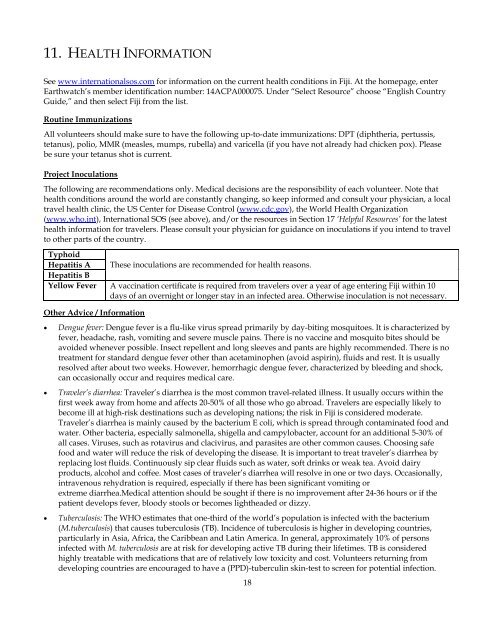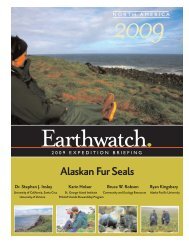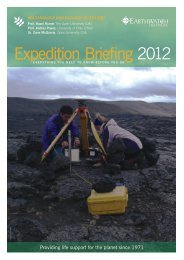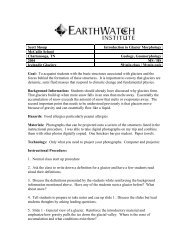Fiji's Ancient Seafarers Dr. Patrick D. Nunn - Earthwatch Institute
Fiji's Ancient Seafarers Dr. Patrick D. Nunn - Earthwatch Institute
Fiji's Ancient Seafarers Dr. Patrick D. Nunn - Earthwatch Institute
You also want an ePaper? Increase the reach of your titles
YUMPU automatically turns print PDFs into web optimized ePapers that Google loves.
11. HEALTH INFORMATION<br />
See www.internationalsos.com for information on the current health conditions in Fiji. At the homepage, enter<br />
<strong>Earthwatch</strong>’s member identification number: 14ACPA000075. Under “Select Resource” choose “English Country<br />
Guide,” and then select Fiji from the list.<br />
Routine Immunizations<br />
All volunteers should make sure to have the following up-to-date immunizations: DPT (diphtheria, pertussis,<br />
tetanus), polio, MMR (measles, mumps, rubella) and varicella (if you have not already had chicken pox). Please<br />
be sure your tetanus shot is current.<br />
Project Inoculations<br />
The following are recommendations only. Medical decisions are the responsibility of each volunteer. Note that<br />
health conditions around the world are constantly changing, so keep informed and consult your physician, a local<br />
travel health clinic, the US Center for Disease Control (www.cdc.gov), the World Health Organization<br />
(www.who.int), International SOS (see above), and/or the resources in Section 17 ‘Helpful Resources’ for the latest<br />
health information for travelers. Please consult your physician for guidance on inoculations if you intend to travel<br />
to other parts of the country.<br />
Typhoid<br />
Hepatitis A These inoculations are recommended for health reasons.<br />
Hepatitis B<br />
Yellow Fever A vaccination certificate is required from travelers over a year of age entering Fiji within 10<br />
days of an overnight or longer stay in an infected area. Otherwise inoculation is not necessary.<br />
Other Advice / Information<br />
• Dengue fever: Dengue fever is a flu-like virus spread primarily by day-biting mosquitoes. It is characterized by<br />
fever, headache, rash, vomiting and severe muscle pains. There is no vaccine and mosquito bites should be<br />
avoided whenever possible. Insect repellent and long sleeves and pants are highly recommended. There is no<br />
treatment for standard dengue fever other than acetaminophen (avoid aspirin), fluids and rest. It is usually<br />
resolved after about two weeks. However, hemorrhagic dengue fever, characterized by bleeding and shock,<br />
can occasionally occur and requires medical care.<br />
• Traveler’s diarrhea: Traveler’s diarrhea is the most common travel-related illness. It usually occurs within the<br />
first week away from home and affects 20-50% of all those who go abroad. Travelers are especially likely to<br />
become ill at high-risk destinations such as developing nations; the risk in Fiji is considered moderate.<br />
Traveler’s diarrhea is mainly caused by the bacterium E coli, which is spread through contaminated food and<br />
water. Other bacteria, especially salmonella, shigella and campylobacter, account for an additional 5-30% of<br />
all cases. Viruses, such as rotavirus and clacivirus, and parasites are other common causes. Choosing safe<br />
food and water will reduce the risk of developing the disease. It is important to treat traveler’s diarrhea by<br />
replacing lost fluids. Continuously sip clear fluids such as water, soft drinks or weak tea. Avoid dairy<br />
products, alcohol and coffee. Most cases of traveler’s diarrhea will resolve in one or two days. Occasionally,<br />
intravenous rehydration is required, especially if there has been significant vomiting or<br />
extreme diarrhea.Medical attention should be sought if there is no improvement after 24-36 hours or if the<br />
patient develops fever, bloody stools or becomes lightheaded or dizzy.<br />
• Tuberculosis: The WHO estimates that one-third of the world’s population is infected with the bacterium<br />
(M.tuberculosis) that causes tuberculosis (TB). Incidence of tuberculosis is higher in developing countries,<br />
particularly in Asia, Africa, the Caribbean and Latin America. In general, approximately 10% of persons<br />
infected with M. tuberculosis are at risk for developing active TB during their lifetimes. TB is considered<br />
highly treatable with medications that are of relatively low toxicity and cost. Volunteers returning from<br />
developing countries are encouraged to have a (PPD)-tuberculin skin-test to screen for potential infection.<br />
18
















